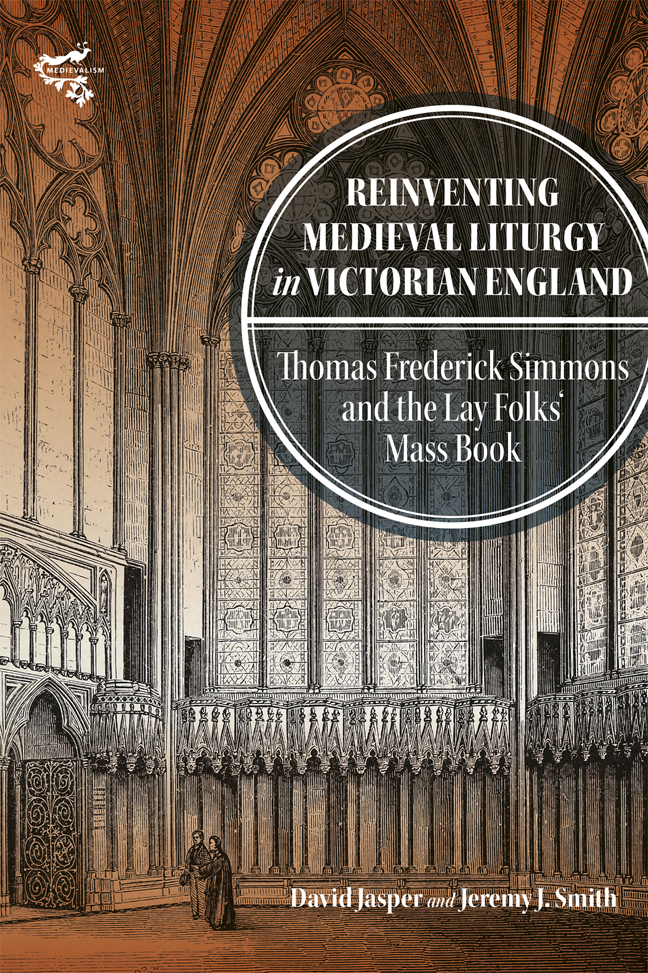 Reinventing Medieval Liturgy in Victorian England
Reinventing Medieval Liturgy in Victorian England Book contents
- Frontmatter
- Dedication
- Contents
- List of Plates
- Preface
- A note on citations
- List of abbreviations
- Introduction: Imagining the Past
- 1 Thomas Frederick Simmons and The Lay Folks’ Mass Book
- 2 Re-imagining Medieval Devotion: Nineteenth-Century Conceptions of the English Church
- 3 Simmons and the Early English Text Society
- 4 Simmons as Editor: The Philologist
- 5 Simmons as Editor: The Liturgist
- 6 Simmons as Parish Priest, and Liturgical Reform in the Victorian Church of England
- 7 The Afterlives of The Lay Folks’ Mass Book
- Conclusion: Liturgical Moments in Time
- Plates
- Appendix I The Lay Folks’ Mass Book: Text and Translation
- Appendix II The Lay Folks’ Mass Book and the Sarum Rite
- Bibliography
- Index
- Miscellaneous Endmatter
5 - Simmons as Editor: The Liturgist
Published online by Cambridge University Press: 02 March 2024
- Frontmatter
- Dedication
- Contents
- List of Plates
- Preface
- A note on citations
- List of abbreviations
- Introduction: Imagining the Past
- 1 Thomas Frederick Simmons and The Lay Folks’ Mass Book
- 2 Re-imagining Medieval Devotion: Nineteenth-Century Conceptions of the English Church
- 3 Simmons and the Early English Text Society
- 4 Simmons as Editor: The Philologist
- 5 Simmons as Editor: The Liturgist
- 6 Simmons as Parish Priest, and Liturgical Reform in the Victorian Church of England
- 7 The Afterlives of The Lay Folks’ Mass Book
- Conclusion: Liturgical Moments in Time
- Plates
- Appendix I The Lay Folks’ Mass Book: Text and Translation
- Appendix II The Lay Folks’ Mass Book and the Sarum Rite
- Bibliography
- Index
- Miscellaneous Endmatter
Summary
Sources for Simmons’ liturgical commentaries
In Chapter 4 we addressed Simmons’ editing of the LFMB largely from the per-spective of his editorial activities as a philologist and active member of the EETS. Simmons, who was as we have seen mindful of the literary and non-theological concerns of the EETS, had drawn for many of his references in his notes upon the growing contemporary interest in the Middle English poetry of Chaucer, Langland, Gower, Lydgate and others. He also referred to such canonical literary critics as Thomas Warton and his substantial History of English Poetry (London, 1774–81) with its significant emphasis on medieval literature; modern literary scholarship now tends to dismiss the work of Warton, though David Matthews has credited him with opening up historical criticism, at a time when there were few scholarly guides to offer professional assistance.
But Simmons also engaged in depth – in a way which shows an interest prefiguring twentieth-century attempts to effect a synergy between literature and theology – with a substantial body of writing on the history of liturgy. In addition to the work of Palmer, Maskell, Dickinson and Henderson – all discussed in chapter 2 above – he made considerable use of both continental and British sources for medieval liturgical study that these earlier authorities had themselves referred to: Mabillon, Martène, Bingham, Gough, and Dibdin, and – of special interest to Simmons for his writings on the early liturgical traditions of Rouen – Le Brun des Marettes. Other continental writers, many of them also used by Palmer and Maskell, to which Simmons makes frequent reference include Goar, Renaudot, and the Italian theologians Catalani and Zaccaria.
Simmons’ liturgical reading is revealed especially in the comprehensive set of ‘Notes and Illustrations’ that appear on pp. 155–401 of his edition: an astonishingly large body of material given that the longest version of LFMB, the B-text, is a mere 630 lines. Simmons’ notes are made complicated by themselves being supplied with a considerable battery of footnotes (themselves occasionally supplemented by foot-notes). Their content is very different not only in length but also from not being restricted to the philological focus supplied by, for instance, Richard Morris or Walter Skeat for their near-contemporary editions of Cursor Mundi or Piers Plowman. Simmons in sum was attempting to deploy, with reference to a vernacular text, the same degree of attention, range and ambition that editors such as Maskell had afforded Latin medieval liturgical texts.
- Type
- Chapter
- Information
- Reinventing Medieval Liturgy in Victorian EnglandThomas Frederick Simmons and The 'Lay Folks' Mass Book', pp. 95 - 118Publisher: Boydell & BrewerPrint publication year: 2023


